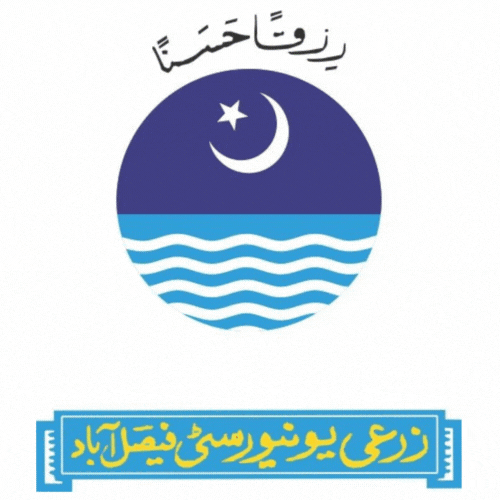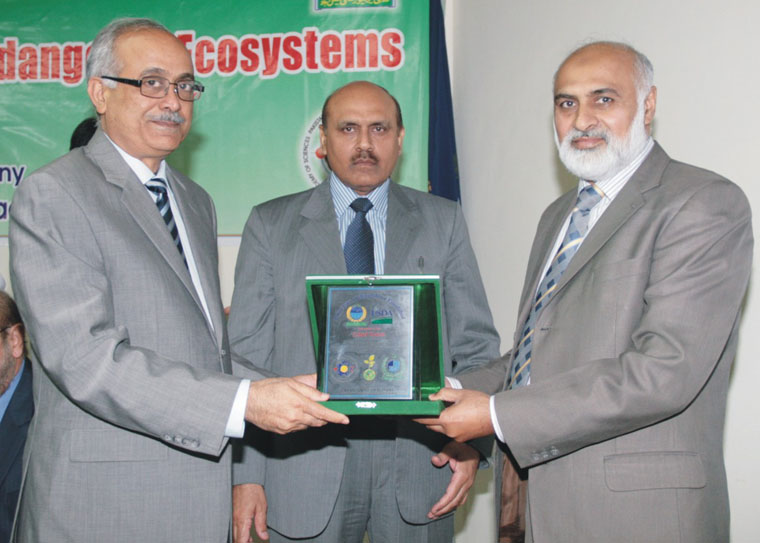
Three-day International Symposium on Strategies Conservation of Endangered Ecosystem
Climate changes have impacted on Pakistan a loss of around $3.57 billion over past 18 years in the shape of floods’ devastation, change in raining and cropping patterns, temperature’s increase, agricultural losses coupled with deforestation and low quality of water. This was stated by speakers at an inaugural session of three-day International Symposium on Strategies Conservation of Endangered Ecosystem on Monday at New Senate Hall, University of Agriculture Faisalabad. The Symposium was arranged by Department of Botany, UAF that was chaired by UAF Vice Chancellor Prof Dr Iqrar Ahmad Khan while National Textile University Rector Prof Dr Niaz Ahmad, Agricultural University Peshawar Vice Chancellor Prof. Dr. Khan Bahadar Marwat, University of Azad Jammu Kashmir, Rawalakot, Vice Chancellor Prof Dr Abdul Rehman and Quid-e-Azam University, Islamabad, Bio Technology Department, Chairman Zabta Khan Shinwari were guests of honour on the occasion. Prof Dr Iqrar Ahmad Khan warned of disasters in main areas including higher temperatures, rise in sea level, glacial retreat, floods, and high frequency of droughts. He said that average global temperature had gone up by 0.6 °C over the past century. It is likely to increase further by 1.1 to 6.4 °C by next century. He said climate changes are resulting from an increasing concentration of Greenhouse Gases (GHGs) in the atmosphere due to the use of fossil fuels and other human activities. He added under the scenario, the changes are posing serious threat to water security, food security and energy security of Pakistan. He said that the University would launch a BSc programme in Ecosystem to train manpower dealing with the issue on the scientific ground. Talking about extent of land degradation in Pakistan, he said that water erosion is 17 percent, wind erosion 8 percent, salinity 9 percent, waterlogging five percent and low organic matter is 96 percent. Prof Dr Niaz Ahmad pollution is damaging ozone layer badly, becoming responsible for the climate changes. He said that the forest net of Pakistan is only 4 percent very low compared to world. He stressed the need to end the deforestation from the county and increase the forest net in Pakistan. He said that the industries were emitting carbon dioxide into air, damaging the ecosystem of world. He stressed the need to joint efforts in a bid to fighting the challenges. He said that glaciers are providing the 70 percent water of the world. But due to damages in the ozone layer, the glaciers are diminishing, causing floods and in future, drought could occur if tangible steps were not taken. Prof. Dr. Khan Bahadar Marwat said that water demands of Pakistan mainly depend upon Indus that is fed by glacier in Himalayas, which are reducing over the last few decades. These impacts are changing the hydrology of the upper Indus Basin that would result in water shortages for millions of people living in the entire basin. He said that Pakistan is standing at 16th in order of climatic change effect whereas agriculture, backbone of our economy depends on glaciers providing 2/3 of water. The melt of glaciers may cut the sustainability of agriculture in Pakistan, he added. He said that increasing temperatures may mean an expansion of weeds into higher altitudes. He said invasive weed species may pose a serious threat to the agricultural ecosystem. Faculty of Sciences, UAF, Dean Prof Dr Muhammad Ashraf talking about effect of climate change on wheat production from 1980-2008 said wheat generally decreased world-over as maximum reduction 0.5 per cent occurred in Brazil, Maxico, Afghanistan and some other countries. The wheat production increased in America, Canada and Australia and as Pakistan and India is concerned, it decreased by 0.2 percent. He stressed the need to promoting involvement of general public, scientists/students, professional groups (such as farmers, fishers) , NGOs. local governments and international collaboration. In the seminar, participants and speakers from many countries including China, Turkey, Saudi Arabia, Malaysia and others participated.

